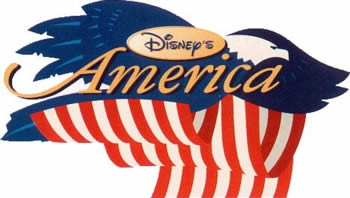
The proposed park was entitled Disney's America and would have featured several lands, each depicting a different era of American history. The focal point to the park featured the turbulent 1860s. This area came complete with a Civil War era town and a military encampment with costumed Union and Rebel soldiers and a Rivers of America-esque lagoon where patrons could witness a fight between the ironclads Monitor and Merrimack (technically the CSS Virginia for the historically minded).
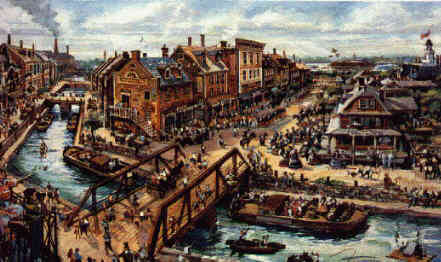
From there visitors could explore President's Square which centered on the nation's origins and included a Hall of Presidents show. Victory Field played to the nostalgia of the Greatest Generation and depicted all manner of aircraft utilized in the World Wars. The thrill seekers in the crowd would have enjoyed Enterprise Town which depicted America's history of industry and innovation, including the roller coaster "Industrial Revolution" which promised to fling riders around a steel mill, complete with blast furnaces.
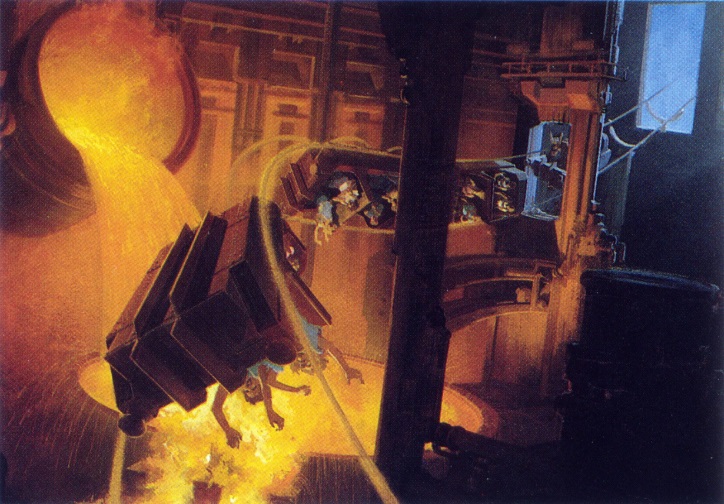
To cool off you could check out Native America which would have included a white-water rafting ride emulating the Lewis and Clark Expedition. (No word if an audio-animatronic Sacagawea would have made an appearance but I would like to think so).
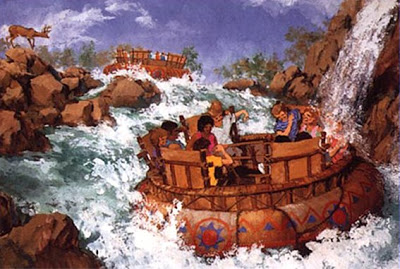
There was even a good old fashioned State Fair area that showcased how Americans could unwind even amidst economic turmoil such as the Great Depression. Patrons could also celebrate the multi-cultural heritage of America by visiting a recreation of Ellis Island in the We the People
land.
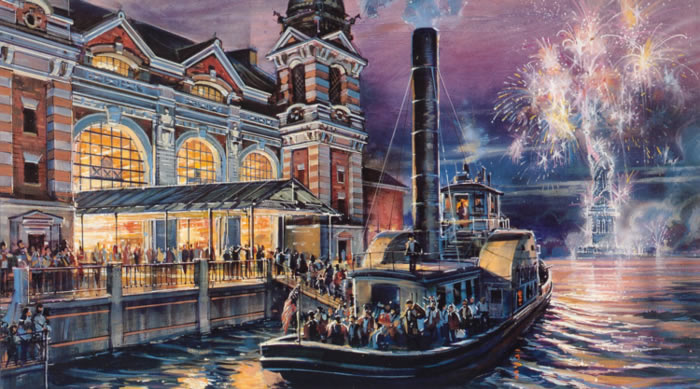
But it was not meant to be. Some local residents of Prince William County balked at the massive proposal and feared the new park would lead to an abundance of gaudy hotels and restaurants unsuitable to their quiet county. Opposition groups also feared the natural beauty and environment would forever be overshadowed by the giant mouse barreling toward them. Historians likewise entered into the fray and offered professional credibility to the citizen opposition groups. Even famed documentary producer Ken Burns came out publicly against Disney.
Opposition advocates efficiently organized and founded Protect Historic America to bring their grievances publicly. They feared that tourists would now skip actual historic sites like Manassas and just get their history from Disney. Worse still, the popularity of the park would lead to further growth which could start to jeopardize historical preservation. They railed against the "Disneyfication" that would take place if such a park
were allowed to be built. The theme park would be showcasing America but a dumbed down, historically inaccurate picture of the nation's heritage. Would the Amero-centric and jingoistic concept alienate visitors from other countries? How could Disney accurately capture the horror of slavery in their Civil War era town? Would Enterprise town explore labor unrest and detail the long, arduous fight for an eight hour workday? How would the premier attraction in Native America, the Lewis and Clark rapids ride, deal with the long line of broken promises and treaties? The answer, unsurprisingly, is that Disney would not address these issues and instead would opt to ignore them completely and offer a whitewashed, sterile version of American history. Delving even deeper, the whole tone of the park was misguided. This was great white man history that merely gives passing reference to immigrants and Native Americans and neglects women and African-Americans. Ultimately, the opposition prevailed.
The outcry against Disney reached such a level that Eisner in 1994 cancelled the proposal. (Some of the ideas, like Victory Field and the rapids ride were resurrected and re-themed for use in California Adventure.)
The controversy reveals a much larger question than simply where the next theme park should be built. The bigger question asks are we sharers or guardians of history? Everyone is a historian to some extent as we all must know the past to understand ourselves and must wrestle with this concept.
A guardian is a protector of historical interpretation. Historians exist to set the record straight (though "truth" in history is often elusive), refine our understanding of the past so that we may influence the future. Without critical assessment of one's past, you can easily fall into the trap of super-patriotism which can border into dangerous xenophobic ground. To constantly present the United States as savior of the Earth, through our innovation, welcoming attitudes and can do spirit oversimplifies a complex topic and downplays the legitimate contributions of countless Americans who sought to solve our nation's issues. To ensure we do not make the same mistakes of the past we must look in the mirror and acknowledge our shortcomings without forgetting our strengths.
But Enterprise town may have inspired a kid to learn more about the time period and dig deeper than what Disney portrayed. Would that modicum of interest been absent without a ride on the "Industrial Revolution." The sharing of history is no less important than guardianship. In order for history to stick and remain relevant with most people, it must be presented in an entertaining and thought provoking manner. But while walking through a marketplace where a slave auction is taking place may be historically accurate it is not an activity that most tourists will want to flock to on a bright Saturday morning. Simply put, can history be fun? Was there a way for Disney's America to succeed as both tourist destination and accurate representation of history or was it mutually exclusive? Disney can masterfully transform an area into another place though immersive environments. Can they also take us through an accurate representation of time or should they stick with fantastical places like the upcoming Avatar land? Please post your thoughts in the comments section.
All concept art comes from disneyandmore.blogspot.com and www.disneydrawingboard.com. For additional information on the debate over Disney's America seechotank.com/disneyrom.html
Tweet
But since then, Disney's all but abandoned non-fiction storytelling. Fiction's taken over more and more of Epcot. Tomorrowland's tomorrow appears to lie with Star Wars and superheroes. Disney couldn't resist fictional overlays for Animal Kingdom, and its big expansion will focus on Avatar.
Could Disney's America have changed that course? I don't know, but I do believe that the timing for this park was awful. A couple years after Disney's America died, James Loewen published Lies My Teacher Told Me: Everything Your American History Textbook Got Wrong, a wildly successful book that challenges the simplistic and incomplete versions of American history that many textbooks teach -- versions that Disney's America often echoed.
The rise of the Internet in the late 1990s opened more Americans to accepting additional points of view that they simply never heard before the Web destroyed the barriers to entry in the news and publishing businesses. If Disney had built Disney's America as planned in the early 1990s, I think the criticism only would have intensified after the publication of Loewen's book and the widespread adoption of the Web.
That said, I would love to see a theme park company try a non-fiction park. It's not as if designers couldn't put one together. Many of the same designers who create theme parks also create projects for the museum industry -- non-fiction, themed storytelling that includes the participation of historians and other social and physical scientists in those developments.
LOL! Been to that part of PW County lately? Manassas is a awash in cheap strip malls. Traffic is horrific. The Disney Park would have been a massive step up.
And from what I understand, there is some other "development" currently proposed that would take away some of the Battlefield park. I cannot recall right now what exactly. Of course, nowadays, jurisdictions horribly abuse their imminent domain power, so who knows what will happen now.
Great article.
Sam Gennawey
There's a book that includes some details on the subject: Battling for Manassas: The Fifty-Year Preservation Struggle at Manassas National Battlefield Park, by Joan M. Zenzen.
A side note: At the time Disney was still pursuing this, Lego explored building a LegoLand at the other end of Prince William County -- likely because of the synergy they'd get from Disney's client list. When Disney pulled out, Legoland faded off the radar here as well.
Prince William County does have some overgrowth, but we also have had a strong push to preserve portions of our rural nature. Even building things next to the existing Battlefield property has been contentious, and there is a constant undercurrent of support to actually move a major road (route 29) OUT of the park.
I have no doubt that Prince William would be a largely different place today had Disney come in. With the proximity to the Nations Capital, we would have become a major tourist attraction, and with a lot of undeveloped land in this and neighboring counties, it seems certain other groups would have come in with their own tourist development.
I wouldn't pretend to know if it would be better or worse; just different.
I've been a resident of Prince William County since 1981.
http://samlanddisney.blogspot.com/2011/01/disneys-america-story-part-four.html
"What Disney didn’t count on was that the opposition was not going to come from those who lived closest to the project but some very wealthy, very well connected people west of the Disney’s America site in Loudoun and Fauquier counties. This area is what is referred to as the Virginia Hunt Club set and is the home to some very powerful people with familiar names. They included the DuPonts, the Marriotts, the Mellons, and the before mentioned publisher of the Washington Post, Katherine Graham. Toss in such media personalities as actor Robert Duvall and the political power couple, Mary Matalin and James Carville. Disney was finding itself in a public perception mess."
That article goes on to note that this group had an organization already called the "Piedmont Environmental Council", which is active politically to stop development.
If Six Flags and Busch Gardens can do America, I think Disney can do it too.
I believe the Virginians not wanting the crowds seems to make the most sense. There were Floridians that felt the same way too.
Today's Disney focuses on franchises. I can imagine the many ways they will change the original rides to fit the latest franchise IP. The park will deviate enough that you'll call it Disney's Captain America.
A link between this ambition and Disney America concept is (for me) affirmed by the parks concept for an area called "Enterprise." In 1985 I saw Frank Wells speak in Orlando where he displayed concept artwork for a working light industry/business park that the company was considering building in Orlando. Guests could ride through working business environments and learn about innovation and efficiency. The project was to be called the EPCOT Enterprise Park. So there's that word again.
While I think Disney's America would have worked so well with today's Disney, it seems as if the company itself was not completely sold on the idea. As I recall, other states (I think, Maryland) stepped up and offered Disney tax abatement deals to build the park.
What I find interesting about the story of Disney's America is that the concerns about growth management had less to do with Disney's ability to responsibly develop the project and more to do with local and state governments being able to manage the impact. Certainly Disney would not have been all that pleased had gaudy development cropped up around the property.
It's too bad. I would have enjoyed visiting a domestic Disney park covered in snow.
That learning and fun should be going together is actually beyond be. I remember the last class of elementary school. We had a fieldtrip to a concentration camp. We walked the grounds, watched the pictures of gruesome piles of dead and naked bodies of women, children and elderly who thought they would go for a shower but where gassed. A survivor told about the daily horrors. Before we went we were prepared about what we would see and was it put in historical perspective.
There where no coasters, carousels or dark rides but it made a huge impact on everyone. I just don't see Disney produce something that would make something like that (American history has many of these kind of stories of racism, wars and bloodshed) do justice without the public demanding a Mickey or Captain America and if they would have gone that way (even without the characters), but going the vanilla way, it would cheapen history and the lessens we should learn from it.
I really believe EPCOT is a good example that Disney can both inform and entertain. Besides Captain Eo and Soarin, all the other attractions do have some educational aspect to it, Disney franchise or not. You do realize that Turtle Talk with Crush does have Crush give accurate answers to any science questions.
To plug future TPI content, Robert does have an interview coming up with a higher up at Disney. He poses the question "Does every new ride have to have a licence character?" The answer was one of the most insightful things I have heard from Disney in awhile.
I think the main issue at hand is no matter where you put a Disney Park, the land and community will change. I can't find the quote right now, but Walt Disney once said he had second thoughts about putting Disneyland in Anaheim, but now if the citizens of Anaheim would have known what would become of Disneyland, they would NOW have second thoughts.
It's a fine line for an entertainment company or a movie maker to tell a story with true historical accuracy, because telling the whole story involves telling the dark side as well, something that doesn't always mesh well with the narratives that audiences are used to. Disney's brand of happiness and a safe environment, etc simply doesn't match with that of a true historian, because true, accurate history isn't always happy and safe. Telling true tales of slavery, war, or Native Americans isn't possible without acknowledging some pretty dark stuff about our own culture.
It's funny how Hollywood and the like often tell historical tales with a black/white mentality, leaving most of the grey (aka most of the real story) out. The historical figures often become caricatures of themselves for the sake of theater as the story becomes simplified for the purposes of entertainment. There could be several reasons why...profit and agenda comes to mind, but it could also be that the story can't be told in two hours, and so the film makers are left to simply hit the "high points". Other times though, they take extensive freedom with history because they are incapable of properly writing it, placing narrative over accuracy when it doesn't have to be. Cinderella Man, for example...great uplifting movie with drama and triumph and all the Hollywood trimmings, but very innacurate in it's portrayal of the antagonist Max Baer as a mean spirited, villianous killer in the ring. While it made for great drama (and box office receipts), it simply wasn't true. I do agree that audiences these days are more open to hearing the entire story. Even Disney in recent years has done much to tell the story better than it used to. The 2004 film "The Alamo" (released by Disney's Touchstone) represents a well told and much more historically accurate version of Davy Crockett and the Texas army than the 1950's Disney TV show or other previous incarnations. Ironically enough though, the film failed at the box office and got several negative reviews. On the other hand, Spielberg's mostly accurate "Lincoln", gets glowing reviews eight years later, even though the films are actually quite similar in their pace, acting ability, historical content, etc, so the anomale is there.
As a history fan, I think that it's better left to those who can tell it like it really was, otherwise how can we learn from it? We've been told enough fairy tales IMHO. Being entertained isn't the primary goal of history, although it certainly is possible when in the hands of capable creative minds who respect it.
My great Grandma from Norway hated the Epcot ride because of how it depicted Norway; you get attacked by trolls and end at an ugly oil rig. Now the stave church is going to be a Princess meet and greet. Uff da!
If Disney built this park it would had been a do once then sleep on it attraction like Hall of Presidents, Lincoln, and American Adventure.
The fantasy part of Epcot has felt dated quicker and needed more updates then the more realistic world show case which has mostly sat unchanged or had unwanted changes.
Realistic is definitely the cheaper and easier way to theme. The story and buildings are already made just copy and paste.
As cool as some of the ideas seem (and I love the American Adventure in Epcot) I'm kinda glad this park did not get built. Too much would have been left out.
http://idealbuildout.blogspot.com/2013/03/varied-resolution.html
Actually, anyone interested in theme park design and history would do well to check that blog out, but I always found his design for this park to be one of the best. The only element that I found to be missing was a Wild West section.
This article has been archived and is no longer accepting comments.